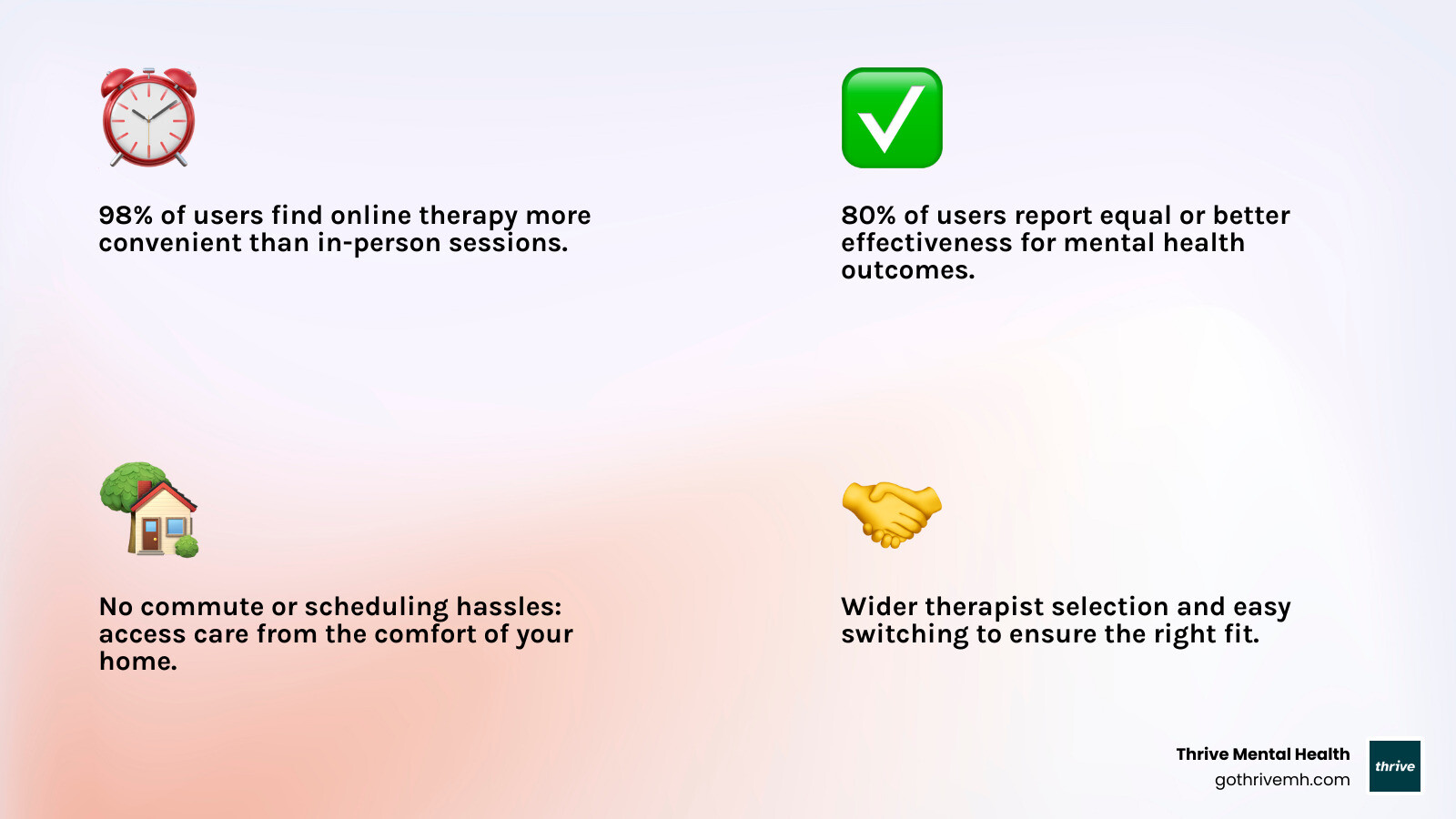Swipe Right on Mental Health: Best Online Therapy Services for Adults

Online Therapy for Adults: Best 2025 Healing
Your Guide to Virtual Mental Wellness
Online therapy for adults has revolutionized how millions access mental health care, with 4 out of 10 Americans now choosing virtual sessions since 2021. Instead of navigating long waitlists and rigid schedules, you can now find expert, evidence-based care that fits your life.
The key is finding a platform that aligns with your needs, whether you require weekly sessions or more structured support like a virtual Intensive Outpatient Program (IOP).
Key Benefits of Online Therapy:
- Convenience: 98% of users find it more convenient than in-person therapy.
- Effectiveness: 80% report that it’s equally or more effective.
- Flexibility: No commute time or scheduling hassles.
- Choice: It’s often easier to switch therapists to find the right fit.
The mental health landscape has shifted dramatically. Long wait times, expensive sessions, and rigid schedules no longer have to block your path to wellness. Research shows virtual therapy is just as effective as face-to-face treatment for conditions like anxiety and depression – sometimes even more so.
Whether you’re dealing with work stress, relationship issues, or deeper mental health challenges, the right online platform can connect you with licensed professionals who understand your unique needs. The key is knowing what to look for and which services align with your goals, budget, and lifestyle.
As Anna Green, LMHC, LPC, and Chief Clinical Officer at Thrive Mental Health, I’ve spent years developing virtual-first behavioral health programs that prioritize access and outcomes. My experience leading clinical strategy for online therapy for adults has shown me how the right virtual care can transform lives when traditional barriers are removed.

Common online therapy for adults vocab:
- 24/7 mental health professional support
- expert mental health professionals
- mental health recovery program
Is Virtual Therapy Worth It? [Benefits vs. Drawbacks]
The shift to virtual care has opened up unprecedented opportunities for mental wellness, but is online therapy for adults really worth it? The answer depends on your unique situation, but for most people, the benefits far outweigh the drawbacks.
At its core, online therapy for adults is professional mental health counseling delivered over the internet. This can happen through video calls, phone sessions, live chat, or messaging. The goal remains the same as traditional therapy—providing support, guidance, and tools for managing mental health challenges—but the delivery method creates some unique advantages and considerations.
Key Benefits of Going Online
The convenience factor alone has revolutionized how adults access mental health care. A remarkable 98% of users find online therapy more convenient than traditional face-to-face sessions. Think about it: you can attend your therapy session from your living room during a lunch break, or even while traveling. No more rushing through traffic, searching for parking, or rearranging your entire day around a single appointment.
Geographic barriers simply disappear with virtual therapy. For adults in rural areas, those with mobility challenges, or anyone with a demanding schedule, accessing specialized mental health care used to be incredibly difficult. Online platforms connect you with licensed therapists across Florida, from major cities like Miami and Tampa to more rural communities. This expanded reach means you’re far more likely to find a therapist who truly understands your background and specific needs.
Cost considerations often make online therapy more accessible. While prices vary, virtual sessions frequently cost less than traditional in-person visits. Many platforms offer subscription models that can be more economical than paying per session, and reduced overhead for therapists often translates to savings for clients.
Privacy and reduced stigma play a huge role for many adults. Walking into a therapist’s office can feel daunting due to lingering societal attitudes about mental health. Online therapy offers a discreet way to seek help from your own private space, making it easier to open up and engage fully in the therapeutic process.
The flexibility of communication options sets virtual therapy apart. Whether you prefer face-to-face video calls, the convenience of messaging throughout the day, or the simplicity of phone conversations, online platforms accommodate different comfort levels and preferences.
Consistent care becomes much easier when life gets unpredictable. Rescheduling in-person appointments can disrupt your progress, but online therapy makes it simpler to maintain regular sessions even when you’re traveling or dealing with schedule changes. This continuity is vital for effective therapeutic outcomes.
For a deeper dive into how these benefits work in practice, check out our guide on Virtual Therapy: A Convenient and Effective Approach to Counseling.
Potential Limitations and When to Seek More Support
While online therapy for adults offers significant advantages, it’s not a perfect solution for everyone. Understanding the limitations helps you make the best choice for your situation.
Crisis situations require immediate, in-person intervention. Online therapy platforms aren’t equipped to handle severe psychiatric emergencies, suicidal thoughts, or immediate self-harm risks. These situations need urgent professional care that can only be provided face-to-face.
If you’re in crisis or thinking about harming yourself, call or text 988 immediately. You are not alone.
Technology dependence can create unexpected challenges. You need reliable internet, an appropriate device, and a private space for sessions. Technical glitches, poor connections, or interruptions at home can disrupt the therapeutic process and impact your progress.
State licensing laws add another layer of complexity. Your therapist must be licensed in the state where you’re physically located during sessions. While most platforms have extensive networks to work around this, it can sometimes limit your therapist options.
Severe mental illnesses often require more intensive support than standard online therapy can provide. Conditions that need close monitoring, medication management, or structured treatment may benefit from higher levels of care. That’s where programs like our virtual intensive outpatient (IOP) options come in—offering more comprehensive support while maintaining the flexibility of virtual care. Learn more about How Virtual Intensive Outpatient Programs Are Revolutionizing Mental Health Care.
Subtle communication cues can sometimes get lost in virtual sessions. While video calls capture most non-verbal communication, some nuances of in-person interaction might be missed. However, experienced online therapists are skilled at adapting their approach to work effectively in virtual settings.
| Feature | Online Therapy | In-Person Therapy |
|---|---|---|
| Cost | Often more affordable ($60-$100/week for subscriptions) | Typically higher ($75-$200+ per session) |
| Convenience | High: Access anywhere, no commute, 98% find more convenient | Moderate: Requires travel, fixed appointments |
| Effectiveness | High: Proven as effective for many conditions, 80% report equal/better outcomes | High: Long-established effectiveness |
| Best Use Cases | Mild to moderate depression, anxiety, stress, relationship issues, busy schedules | Severe mental illness, crisis intervention, complex situations |
Understanding these benefits and limitations helps you determine whether online therapy for adults aligns with your current mental health needs and life circumstances.
How to Find the Right Online Therapy for Adults [2025 Guide]
Finding the perfect online therapy for adults doesn’t have to feel overwhelming. Think of it like finding the right workout buddy – you want someone who gets your goals, matches your style, and makes you feel comfortable pushing yourself. The key is knowing what you need before you start looking.
The beauty of online therapy lies in its matching process. Most platforms use detailed questionnaires to pair you with therapists who specialize in your specific concerns. But here’s the thing – the better you understand your needs upfront, the more likely you’ll find that perfect therapeutic fit on the first try. For a comprehensive look at this process, check out our guide on How to Choose the Right Individual Online Counseling Service for Your Needs.
Step 1: Pinpoint Your Needs (Anxiety, Trauma, Stress?)
Before diving into therapist profiles, take a honest moment with yourself. What’s really going on? Are you lying awake at 3 AM replaying conversations from work? Feeling disconnected from your partner? Still processing something difficult from your past?
Depression often shows up as that heavy feeling where even small tasks feel impossible, or when nothing brings you joy anymore. Many online therapists specialize in evidence-based approaches like CBT that can help lift that fog and get you back to feeling like yourself.
Anxiety and stress might feel like your brain won’t turn off, or maybe you’re avoiding situations that used to feel manageable. The good news? Online therapy for adults has proven incredibly effective for anxiety disorders. We even have specialized resources for Online Therapy for Stress that can help you develop real tools for managing overwhelm.
Trauma and PTSD require specialized care, but online platforms have made it easier to access trauma-informed therapists trained in approaches like EMDR or Cognitive Processing Therapy. You don’t have to carry those experiences alone – Online Counseling for Trauma can provide the support you deserve.
Relationship challenges don’t always mean couples therapy. Sometimes individual therapy helps you understand your patterns and communicate better. Online platforms make it easier to find therapists who understand relationship dynamics without the awkwardness of bumping into someone you know in a waiting room.
Life transitions – career changes, loss, becoming a parent, or navigating identity – can leave you feeling unmoored. Online therapy offers the flexibility to work through these changes on your timeline, from wherever you feel most comfortable.
Step 2: Understand Therapist Types and Treatment Styles
Not all therapists are the same, and that’s actually a good thing. Different training means different strengths, so understanding the basics helps you find your match.
Licensed Clinical Social Workers (LCSW) often take a holistic approach, looking at how your environment and relationships impact your mental health. They’re great at connecting the dots between your personal struggles and bigger picture factors.
Licensed Marriage and Family Therapists (LMFT) specialize in relationship dynamics, whether you’re working on your marriage, family relationships, or even understanding how your family patterns show up in other areas of life.
Licensed Professional Counselors (LPC) provide broad-based mental health support, often with specializations in specific areas like anxiety, depression, or trauma.
Psychologists hold doctoral degrees and bring deep expertise in psychological assessment and various therapeutic approaches.
Here’s something important to remember: therapists provide talk therapy and coping strategies, while psychiatrists prescribe medication. Some online therapy for adults platforms offer both, but your therapist alone can’t prescribe medication – that requires a separate appointment with a psychiatrist or psychiatric nurse practitioner.
The therapeutic approach matters too. Cognitive Behavioral Therapy (CBT) is like having a personal trainer for your thoughts – it helps you identify and change patterns that aren’t serving you. It’s the gold standard for anxiety and depression. Learn more about Cognitive Behavioral Therapy: What You Need to Know.
Dialectical Behavior Therapy (DBT) focuses on emotional regulation and distress tolerance – incredibly helpful if you feel like emotions hit you like a tsunami. Find How Dialectical Behavior Therapy (DBT) Can Improve Mental Health.
For trauma, EMDR therapy can be transformative, helping process difficult memories in a safe, structured way. If trauma is part of your story, consider exploring Find Top EMDR Therapist: Find Relief Today.
Step 3: Evaluate Privacy, Cost, and Insurance for Online Therapy for Adults
Let’s talk about the practical stuff that can make or break your therapy experience.
Privacy should be non-negotiable. Reputable online therapy for adults platforms must be HIPAA-compliant, using bank-level encryption to protect your sessions and personal information. Your conversations are as confidential as they would be in a traditional office – maybe even more so since you’re in your own private space.
Cost varies widely, but online therapy often offers more affordable options than traditional in-person sessions. Many platforms use subscription models ranging from $60-100 per week, which can be significantly less than the $125-199 per session you might pay for in-person therapy. Some therapists also offer sliding scale fees based on income.
Insurance coverage is increasingly common for online therapy. Major insurers like Cigna, Optum, and Florida Blue often cover virtual sessions just like in-person ones, thanks to the Mental Health Parity Act. However, coverage depends on your specific plan and the platform you choose.
Some platforms don’t directly bill insurance but provide superbills for reimbursement. You can also use FSA or HSA accounts for therapy expenses. We work with many insurance providers and can help verify your benefits through our Insurance Companies page.
If you have Medicaid, finding covered online therapy can be trickier but not impossible. Check out our guide on Medicaid Covered Therapy for more options.
Even with online therapy, local considerations matter. We serve clients throughout Florida, with a strong presence in Tampa Bay, St. Petersburg, Miami, and Orlando. This allows us to offer both virtual and hybrid programs, giving our Florida clients the flexibility of online therapy with the option for in-person support when they need it.
Finding the right therapist sometimes takes a few tries, and that’s completely normal. Most online platforms make switching therapists easy and discreet, so don’t feel stuck if the first match isn’t perfect.
How Effective Is Online Therapy? [The Science]
If you’re considering online therapy for adults, you’re probably wondering: does it actually work? The research is overwhelmingly positive, and frankly, it might surprise you just how effective virtual care can be.

Over the past decade, researchers have studied virtual therapy extensively, and the results consistently show that online therapy for adults isn’t just a convenient alternative—it’s often just as effective as traditional face-to-face sessions. For many conditions, particularly anxiety and depression, the outcomes are virtually identical.
The numbers speak for themselves. Studies tracking people using virtual Cognitive Behavioral Therapy found that 70% saw meaningful improvement in their anxiety or depression symptoms within just three months. That’s comparable to—and sometimes better than—in-person therapy results. When you consider that many people struggle to find time for weekly office visits, this effectiveness becomes even more impressive.
What’s particularly fascinating is how well different formats work. Even text-based therapy has proven surprisingly powerful. Research published in the Journal of Telemedicine and e-Health found that people receiving therapy through messaging platforms reported high satisfaction and meaningful symptom improvement. There’s something about being able to process thoughts in writing that resonates with many adults.
The evidence for CBT delivered virtually is especially strong. Scientific research on CBT effectiveness shows that 60% to 80% of people with anxiety and depression benefit significantly from this approach, whether delivered online or in person. The structured, skills-based nature of CBT translates beautifully to virtual formats.
But what about more intensive care? Virtual programs aren’t limited to weekly sessions. Our Virtual IOP Program demonstrates that even higher levels of care—structured programs meeting multiple times per week—can be delivered effectively online. This opens doors for people who need more support than traditional therapy provides but can’t commit to full-day treatment programs.
Preparing for Your First Session
Starting online therapy for adults can feel both exciting and nerve-wracking. A little preparation goes a long way toward making your first session feel natural and productive.

Creating your space is probably the most important step. You’ll want somewhere private where you won’t be interrupted—whether that’s a bedroom, home office, or even your parked car. The key is feeling safe to be vulnerable. Headphones can help you feel more connected and ensure privacy if others are around.
Technology prep might seem obvious, but it’s worth double-checking. Test your internet connection, make sure your device is charged, and confirm your camera and microphone work properly. Nothing derails a first session quite like spending fifteen minutes troubleshooting audio issues when you’re already nervous.
Set the stage mentally by thinking about what brought you to therapy right now. You don’t need a detailed agenda, but having some sense of what you hope to address can help your therapist understand where to focus. Maybe it’s work stress that’s gotten overwhelming, relationship patterns you keep repeating, or anxiety that’s interfering with daily life.
Being open from the start sets the tone for your entire therapeutic relationship. Your therapist has heard it all before, and their job is to help, not judge. The more honest you can be about your struggles, the more targeted and effective your treatment becomes.
Is Online Therapy for Adults the Right Choice for You?
Online therapy for adults works wonderfully for many people, but it’s not universal. The key is understanding whether it aligns with your specific needs, comfort level, and circumstances.
Technology comfort matters more than you might think. If video calls feel awkward or you struggle with basic tech functions, you might find yourself distracted during sessions. On the flip side, if you’re already comfortable with virtual meetings for work, therapy will likely feel natural.
Your living situation plays a huge role. Do you have reliable internet and a private space for sessions? If you’re sharing tight quarters with roommates or family members, finding confidential time might be challenging. Some people make it work by scheduling sessions during walks or sitting in their car, but having a consistent private space helps.
Symptom severity is crucial to consider honestly. Online therapy for adults excels with mild to moderate depression, anxiety, relationship issues, and stress management. If you’re experiencing severe symptoms, active substance abuse, or thoughts of self-harm, you likely need more intensive support than weekly virtual sessions provide.
Motivation level often determines success more than the format itself. Online therapy requires you to show up consistently and engage actively, sometimes with less external structure than in-person appointments. If you’re highly motivated to make changes but struggle with traditional therapy barriers like transportation or scheduling, virtual care could be perfect.
The beauty of modern mental health care is that you have options. Whether you start with online therapy for adults, transition to our Virtual IOP Program for more intensive support, or blend virtual and in-person approaches, the goal is finding what works for your unique situation and lifestyle.
Frequently Asked Questions about Online Therapy
When you’re considering online therapy for adults, it’s natural to have questions. We’ve helped thousands of people steer this journey, and these are the concerns that come up most often.
Can online therapists prescribe medication?
This is one of the biggest misconceptions about virtual care. Online therapists cannot prescribe medication – they’re focused on providing talk therapy to help you develop coping skills, process emotions, and work through challenges.
Medication management is a completely separate service handled by psychiatrists or psychiatric nurse practitioners who are medical doctors. Think of it this way: therapists are like skilled coaches who help you build mental wellness tools, while psychiatrists are like doctors who can prescribe medication when needed.
Some platforms do offer both services under one roof, which can be convenient for coordinated care. But your therapist alone cannot write prescriptions – that’s not within their scope of practice, whether they’re online or in-person.
Is online therapy really confidential?
Absolutely, and this protection is actually stronger than many people realize. Reputable online therapy for adults platforms are legally required to be HIPAA-compliant, which means they must meet the same strict privacy standards as hospitals and medical offices.
This translates to bank-level encryption for all communications, secure servers that protect your personal health information, and rigorous data protection protocols. Your sessions, messages, and records are all safeguarded with the same technology that protects your financial information.
The key word here is “reputable” – always review a platform’s privacy policy before starting. Look for clear statements about HIPAA compliance and encryption. If a platform can’t clearly explain how they protect your data, that’s a red flag to keep looking.
What if I don’t connect with my online therapist?
Here’s where online therapy for adults really shines compared to traditional therapy. Finding the right therapeutic fit is crucial for success, and online platforms make switching therapists surprisingly simple and stress-free.
Most reputable platforms have large networks of licensed therapists and allow you to request a new match easily and discreetly. There’s no awkward conversation in a waiting room or feeling trapped with someone who isn’t the right fit.
You might not click with your first therapist, and that’s completely normal. Sometimes it takes meeting two or three professionals before you find someone who truly understands your communication style and needs. The beauty of online therapy is that this process doesn’t have to be complicated or uncomfortable.
Many platforms will even ask for feedback about why the match wasn’t working, which helps them find a better fit for your second try. Finding the right therapist is like finding a good friend – the connection matters, and it’s worth taking the time to get it right.
{
"@context": "https://schema.org",
"@type": "FAQPage",
"mainEntity": [
{
"@type": "Question",
"name": "Can online therapists prescribe medication?",
"acceptedAnswer": {
"@type": "Answer",
"text": "No, online therapists provide talk therapy to help you develop coping skills and process emotions. Medication management is handled by psychiatrists or psychiatric nurse practitioners, which is a separate service. Some platforms offer both, but a therapist alone cannot prescribe."
}
},
{
"@type": "Question",
"name": "Is online therapy really confidential?",
"acceptedAnswer": {
"@type": "Answer",
"text": "Yes. Reputable online therapy platforms are required by law to be HIPAA-compliant. This means they use bank-level encryption and secure servers to protect your private health information and the contents of your sessions. Always review a platform's privacy policy."
}
},
{
"@type": "Question",
"name": "What if I don't connect with my online therapist?",
"acceptedAnswer": {
"@type": "Answer",
"text": "One of the major advantages of online therapy is the ease of switching providers. Most platforms have a large network of therapists and allow you to request a new match easily and discreetly, ensuring you find the right fit for your needs."
}
}
]
}
Take the Next Step Toward Healing
You’ve made it this far, and that alone shows incredible strength. Online therapy for adults isn’t just another digital trend—it’s a genuine pathway to healing that has already transformed millions of lives. The research is clear, the benefits are real, and the barriers that once kept quality mental health care out of reach are finally crumbling.
Think about where you were when you started reading this guide. Maybe you were skeptical about whether virtual therapy could really work. Perhaps you were worried about the cost, the privacy, or finding the right therapist. Now you have the knowledge to move forward with confidence.
The beauty of online therapy for adults lies in its flexibility. You can start small with weekly sessions, or if you need more intensive support, explore structured programs that fit around your life. Whether you’re dealing with anxiety that’s been holding you back, depression that feels overwhelming, or trauma that needs gentle healing, the right support is available—and it’s more accessible than ever before.
Your mental health journey is uniquely yours. Some days will be harder than others, but with the right tools and professional guidance, you can build resilience, develop healthy coping strategies, and create the life you want. The first step is often the hardest, but it’s also the most important one you’ll take.
Ready for support? Thrive offers Florida residents virtual and hybrid IOP/PHP with evening options designed for busy adults who need flexible, evidence-based care. Verify your insurance in 2 minutes (no obligation) → Start benefits check or call our Florida-based team at 561-203-6085. If you’re in crisis, call/text 988.